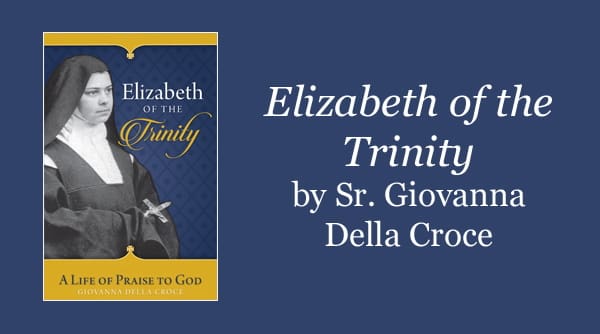St. Elizabeth of the Trinity on the Abyss of Love
Every contemplative life is founded upon the total self-donation to God in order to love Him above every other thing, with the hope of feeling oneself loved by Him with a profound and transforming love.
Elizabeth Catez was one of these contemplatives.
In words borrowed from John of the Cross, she wanted to make her life a lively and enthusiastic effort to arrive at the highest expressions of love for God.
St. John of the Cross, the great doctor of love, says that:
God likes nothing other than love. We cannot give Him anything, nor can we satisfy His only desire, which is that of bringing about the dignity of our souls. The one thing that is pleasing to Him is that the soul grows; but nothing can raise it like becoming, in a certain way, equal to God. That is why He demands from the soul the tribute of its love: the characteristic of love is to make the lover equal to the beloved. The exercise of loving makes the soul equal to the beloved Christ. Love establishes the unity.
 It was this unity of love that Elizabeth nurtured in her personal aspirations, and nothing could disturb the desires of her heart.
It was this unity of love that Elizabeth nurtured in her personal aspirations, and nothing could disturb the desires of her heart.
Stripped of every earthly attachment, she abandoned herself to Christ, her beloved Spouse, like “the turtledove that finds on the grassy shores her long-desired companion. Yes, I found Him whom my soul loves, that One Thing Necessary whom no one can take from me.”
She said this knowing that from all eternity God had “loved her to excess.”
She continued: “There is a word of St. Paul that is like a summary of my life and that could be written on each moment of it: ‘propter nimiam charitatem.’ Yes, this torrent of grace shows that He has loved me excessively — excessively, that is, for a creature who for the past five years had considered herself a prisoner of His love.”
Radiant with happiness, Elizabeth abandoned herself to the experience of being “loved to excess.”
Propter nimiam charitatem: these words from Ephesians 2:4 guided Elizabeth above all in the last phase of her life. She directed her gaze to that “superabundance” that broke into her existence. She felt overcome by something that she could not totally grasp, but that she would have liked to proclaim with exultation, gratitude, and admiration.
In this experience there is a particular mystical intuition, prepared for through her efforts to understand better “the science of charity of which St. Paul speaks and of which my heart would like to plumb the depths.”
Her attraction to the biblical concept of “excess” is beyond all understanding. Elizabeth intuits that there is a bottomless abyss in which she can lose herself, a mysterious abyss that in Elizabeth’s understanding transforms itself into the invisible and immoveable Reality from which all things proceed.
The loss of self in the abyss of love resonated with her reading of Ruusbroec, “L’amour est un abîme, et le fond d’abîme n’existe pas.”
“I read magnificent things,” she wrote to her sister, referring to the doctrine of the Flemish mystic. “He constantly speaks of that interior ‘abyss’ into which we must throw ourselves and in which we lose ourselves, the abyss of love that we possess within ourselves and in which beatitude awaits us if we are faithful in entering into it.”
From the writings of Ruusbroec she had picked up that “the abyss of God calls the elect to a unity of love. . . . United to the spirit of God . . . we possess beatitude with Him and in Him.”
Through her readings of Ruusbroec, this image of the abyss acquired for her a new and particular luminosity because it was tightly bound to the “excess” of the love of God, being a symbol of the absolute immeasurability of love’s greatness.
In one of her final poems, she even speaks of the “double abyss” — the abyss of God’s immensity and the abyss of man’s nothingness — and invites all to throw themselves into that abyss so as to consummate their love in the divine union, which will be “the most sublime praise” that can be raised to the Almighty Lord.
The abyss of the divine immensity cannot be reached except through the action of grace. But the abyss of one’s own nothingness is defeated through an arduous battle against one’s self, because it is “there below that we will find the strength to die to ourselves . . . and we will be changed in love.”
There is a whole plan of descent in self-denial that must be carried out: decrease each day so that Christ may increase.
Elizabeth felt she must stay “very small at the bottom of my poverty. I see my nothingness, my misery, my impotence. I recognize that I am incapable of progress or of perseverance. I behold the multitude of my negligences, of my defects; I look at my neediness. I prostrate myself in my misery and openly recognize it, I expose it to the mercy of my Maestro.” (1 Cor. 15:31).
Christ is the model of this descent with His word of self-denial, doing only what the Father wills. Having arrived at the bottom of the abyss — which is the work of a lifetime — and when all our vestiges are lost, God is free to intervene as a “devouring fire.” The soul can “throw herself into the furnace of burning love” in this abyss, and there will be no other preoccupation in her but that of allowing herself to burn in the flames of the Holy Spirit. Then “sweetly lost in God. . . love fills her so much, absorbs her and protects her so well, that she finds the secret of growing in love everywhere.”
Up to this point Elizabeth’s doctrine of surrender has consisted in self-denial and in throwing oneself into the abyss of nothing, building upon the teachings of John of the Cross and Ruusbroec. While her doctrine addresses God’s intervention through both communications and passive experiences, it does not go beyond the realm of faith.
Nevertheless there is an original insight in Elizabeth’s thought.
It is not enough to believe in God’s great love based on the theological knowledge of revelation, of the divine action in relationship to each person’s history.
It is necessary to believe in the excess of this love, to have the faith that is founded on the fact that God is love, that the inner life of God is a relationship of intimate love in which each human person is called to share as an adopted son and as an icon of God Himself.
This faith “is the means by which we can give God love in return for love” — she is obviously thinking of a correspondence of love — “a faith that is not an intellectual act, but wisdom, right judgment, experiential knowledge, which consents to penetrate into, to arrive all the way at the heart of the Father . . . and our whole soul is astounded.”
Such a faith, one that “knows it must believe in an excessive love,” acquires a remarkable ability to free the soul from personal tastes and feelings; in fact, “little does it matter whether it feels God or not, little does it matter if He gives joy or suffering, the soul believes in His love. The more she is tested, the more her faith grows, because she knows to go beyond the obstacles and rest in the bosom of Infinite Love, who can do nothing but works of love.”
This love tends to increase, to grow more absolute, but does not disengage from the faith that raises its voice with groans and hope toward God-Charity. “It seems to me that this must be the behavior of a praise of glory,” continues Elizabeth in the Last Retreat, “to be unwavering in his faith in this excessive love, as if he had seen the Invisible.”
+
 This article is from a chapter in Elizabeth of Trinity: A Life of Praise to God, which is available through Sophia Institute Press.
This article is from a chapter in Elizabeth of Trinity: A Life of Praise to God, which is available through Sophia Institute Press.
Art for this post on Elizabeth of the Trinity: Cover of Elizabeth of the Trinity used with permission.





